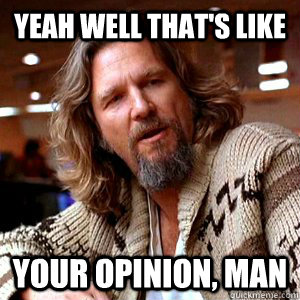If you can handle a bit of profanity, try Googling "Opinions are like" and let the auto suggest fill in the rest. It's actually pretty funny because the most famous quote by Harry Callahan (I won't repeat it, you all know it) isn't the one that pops up for me, but lots of folks seem to have adapted it to fit their favourite body part!
In any case, this post is a bit of a rant about something that has bugged me for a long time, but only recent I've seemed to explicitly notice. That's what I call the theologized opinion. You've probably experienced it. It's when someone forms an opinion about something, it might be important or it might be trivial, and then adapts, invents, and shoehorns a theology around it for the sake of arguing that any other opinion is wrong, and thus anyone else who holds a different opinion is wrong. As a long time music minister I'm well familiar with the theologized opinion, as pretty much everyone in existence has an opinion about music, and when you are called to lead music at Mass, they'll be sure to tell you!
In my experience theologized opinions are most frequently encountered on matters that are somewhat external to the most important things, but somehow tied to them. For example, whether guitars should be allowed at church (I've heard long winded theological arguments that a nylon string guitar should be allowed, but a steel string not allowed), the merits of syncopation and 6/8 timing (seriously, I've heard serious theological arguments that syncopation has no place in church and that 6/8 time can only be used for the closing hymn... sorry Steve Angrisano, I guess you'll have to re-write all of your music!), and the exact rules about what can and can't be worn in Church (usually following a statement along the lines of "I'm not saying we should judge anyone who is different than this ideal, but..." Lance over at Pious Posers just wrote a good piece on this topic, check it out). Of course, I've heard them about much more serious issues as well, the media on all sides is displaying no shortage of them in the wake of the documents that have come out since the beginning of the Synod on the Family. I won't comment on those lest I fall into the same territory.
My favourite recent example comes from Michio Kaku's book 'Hyperspace'. Did you know that at one point in history there was a very specific theological reason that sacred art was fully 2D and flat (those scenes where everyone looks fully two dimensional and there is no perspective in the image)? It was because it was conveying the message that God is above all. That in and of itself is kind of a neat idea, but there were people who theologized that version of art to the point that if they saw something like DaVinci's last supper they'd be horribly offended that it was painted with a 3D perspective that puts the viewer into the painting rather than looking upon it from a holier perspective!
Now I'm not saying that opinions and theology are mutually exclusive (sorry, math/logic term, I'm teaching probability right now). We have theological guidelines about things like how to prepare ourselves for Mass, liturgical music, and of course on the most serious issues like the Family. What I'm getting at is that us religious folks have a temptation to be right about everything, and we use our religion as a blunt tool to make it so. Here's how I see the relationship. An opinion formed from theology has it in the centre. The opinion radiates out from it. It's almost less of an opinion and more of a universally logical conclusion. The theologized opinion is where the opinion came first, and is wrapped up in the theology. In other words, we try to mold the teachings of our faith to fit our agenda. It's something we all do... I certainly do and have. I like to be right and I like to win arguments. It's prideful, and it lacks humility.
Here's why it bothers me. It waters down the important stuff, and it invalidates our theology. If my opinion on something (like say what music should be at Mass) can supersede the truths we seek or profess, then the truth is taking a backseat. It becomes a reason why someone else can just negate the theology along with the opinion because they disagree. The second reason is I've never seen a theologized opinion used for anything but a personal agenda. If I can find a theology for why contemporary music of any sort has no place at Mass, and I have a position with a bit of power, I can make sure that any Mass I attend has music I prefer. Ultimately, I don't like it because it's dishonest. It's being a pharisee. It's using our religion as a weapon rather than an instrument of love and mercy, and in my opinion, no theology offered, using religion as a weapon doesn't lead us down roads that take us closer to God.

P.S. - Shout out to Colm Leyne... You might be a Jerk for Jesus if all your opinions are theologized and you're all to happy to 'share' them with anyone who will (or won't) listen!


No comments:
Post a Comment